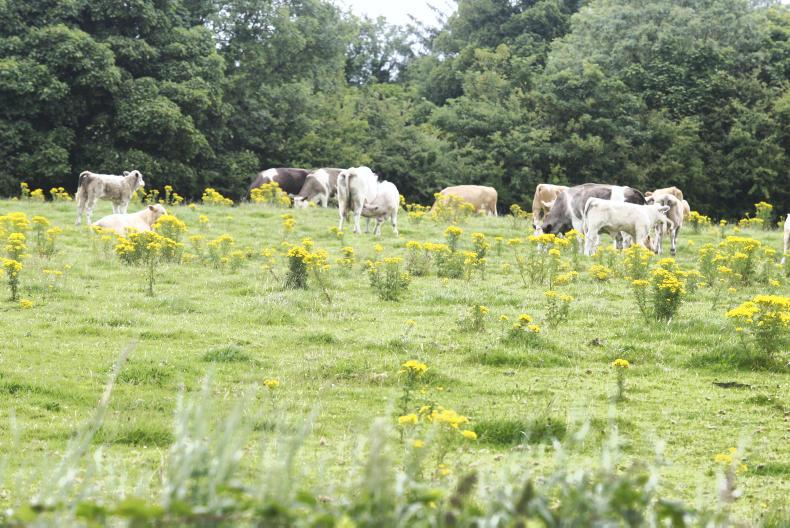Five yearling cattle in Co Cork died due to chronic ragwort poisoning, the county’s regional vet lab discovered.
The lab reported that the five yearlings, all from the same pen on one farm, died over the space of three weeks.
The animals progressively lost weight and suffered from constipation before they became aggressive prior to death, RVL vets reported in the monthly lab report.
When their carcases were examined, the animals were found to have lesions consistent with chronic ragwort toxicity.
Aggressive behaviour
The vets noted that the aggressive behaviour was likely to have been the result of hepatic encephalopathy, changes that occur in the brain of animals with advanced, acute or chronic liver disease. Their diseased livers failed to remove ammonia from the bloodstream, according to the vets.
Limerick RVL also reported the case of a 15-month-old Charolais-cross bullock that had a history of drooling, lack of appetite, depression and tenesmus (straining to empty the bowel).
The bullock was out-wintered on grass and silage of dubious quality
The bullock had been out-wintered on a diet of grass and bought-in, round bale silage of dubious quality.
When the carcase was examined, the animal was in poor body condition and jaundiced.
On examination, the liver was enlarged and hard, with thickened and prominent bile ducts and a full gall bladder.
It had lesions consistent with toxic liver damage and strongly suggestive of ragwort poisoning.
Examined
The bullock and five yearlings were among the 878 adult animals examined by the country’s six RVLS at Athlone, Cork, Kilkenny, Limerick, Sligo, and Dublin in March this year.
The labs also examined 803 foetal carcases during the same month, as well as 3,770 diagnostic samples.
Preventing ragwort spreading
Cattle poisoning: an often dramatic and sometimes overlooked event
Vaccinations are key as we enter autumn
Five yearling cattle in Co Cork died due to chronic ragwort poisoning, the county’s regional vet lab discovered.
The lab reported that the five yearlings, all from the same pen on one farm, died over the space of three weeks.
The animals progressively lost weight and suffered from constipation before they became aggressive prior to death, RVL vets reported in the monthly lab report.
When their carcases were examined, the animals were found to have lesions consistent with chronic ragwort toxicity.
Aggressive behaviour
The vets noted that the aggressive behaviour was likely to have been the result of hepatic encephalopathy, changes that occur in the brain of animals with advanced, acute or chronic liver disease. Their diseased livers failed to remove ammonia from the bloodstream, according to the vets.
Limerick RVL also reported the case of a 15-month-old Charolais-cross bullock that had a history of drooling, lack of appetite, depression and tenesmus (straining to empty the bowel).
The bullock was out-wintered on grass and silage of dubious quality
The bullock had been out-wintered on a diet of grass and bought-in, round bale silage of dubious quality.
When the carcase was examined, the animal was in poor body condition and jaundiced.
On examination, the liver was enlarged and hard, with thickened and prominent bile ducts and a full gall bladder.
It had lesions consistent with toxic liver damage and strongly suggestive of ragwort poisoning.
Examined
The bullock and five yearlings were among the 878 adult animals examined by the country’s six RVLS at Athlone, Cork, Kilkenny, Limerick, Sligo, and Dublin in March this year.
The labs also examined 803 foetal carcases during the same month, as well as 3,770 diagnostic samples.
Preventing ragwort spreading
Cattle poisoning: an often dramatic and sometimes overlooked event
Vaccinations are key as we enter autumn






 This is a subscriber-only article
This is a subscriber-only article





SHARING OPTIONS: